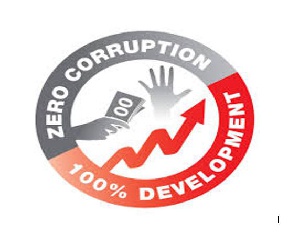Corruption in all its forms either being legislative, bureaucratic, political cannot move together with national development because of it destructive, unwarranted and dangerous to our contemporary national development.
In Ghana, Corruption has been a disease; a national canker that has eating into the Ghana’s cultural, political, economic and even in religion fabric that is inflicting inexpressible damage in our national development.
Corruption has been one of the hoariest and most perplexing phenomenon in every human society that exists in the world including Ghana. The classical conception of corruption, as a universal disease of the body politics, was stated by ancient philosophers Plato and Aristotle and truly, both saw corruption as dysfunctional, which is destructive of a particular political order, be it monarchy, aristocracy or democracy.
National development in other words implies development of a nation as a whole.
It can be best defined as the all-round and balanced development of different aspects and facets of the nation namely political, economic, social, cultural, and scientific inter alia.
It can best achieved through national development planning in a form of collection of strategies mapped out by the government in which if corruption is not decoupled from its policy implementations, sustainable national development cannot be achieved.
In other words, national development is the ability of a county to improve the social welfare of the citizenry by providing social amenities like quality education, potable water, transportation infrastructure, medical care among others and with corruption these could not be achieved.
Moreover, there was several public allegations that facilitated Ghanaians voted NDC out of power including underdevelopment, economic hardship and massive corruption that led to the overwhelming desire for change and during the election, for example, several corruption scandals including the Smarrty’s bus branding scandal, GYEEDA and SADA scandals damaged the strength of the previous \
government to win the election according to experts.
In other views, Nana Akufo-Addo presented himself as an incorruptible public servant at that time, who would tackle corruption seriously as president and truly this is the time the power has given to him to drive the nation to the safe, reliable, peaceful and political corruption-free destination home of national development.
Therefore, the president and his government should be extremely meticulous to refrain themselves from merging corruption with national developmental process and it implementations especially with their policies that was accepted by the majority of Ghanaians like free senior high school, planting for food and jobs, one district one factory among others which serves as sources of national development.
The reason being that corruption is becoming too dominant and retarding Ghana’s national development with the fact that according to 2016 corruption perception index released by Transparency International, Ghana dropped four percentage points in its scoring 43 out of a clean score of 100 they further ranked Ghana 70 out of 176 countries globally; performing worse than countries such as Rwanda, Namibia and Senegal.
Further, corruption has destroyed our political institutions; not in government departments as a structure alone but in rules and regulations, norms, customs, principles and laws that guards, regulate and influence in the process of national developmental decision making and it implementations.
As Carl Fredrich defines corruption as a deviant behavior associated with a particular motivation, namely that of private gain at public expense, the government should work hard by investing in areas that will enhance employment opportunity for unemployed citizens especially the youth, infrastructural development and other social amenities and not rely on party largesse that could contribute immensely to corruption.
According to G. Edward Griffin, opposing corruption in government is the highest obligation of patriotism and therefore, I would like to remind the president about his anti-corruption speech at KNUST when he was a presidential candidate on October, 2012 that his government should take notes and implement anti-corruption policies as a form of actions to fight against corruption as being done against Galamsey now but should not just be a rhetoric.
According to the speech, “Corruption has to be defeated; it reduces revenue to the state; it holds back our economic growth; it leads to the flight of capital out of the country and it inflates the cost of running government. It results in a loss of legitimacy and respect for legally constituted authority. Corruption demoralizes honest people and fills them with uncertainty, mistrust and fear. It stifles initiative and creativity and dampens motivation. It undermines the merit system of rewards, appointments and success and it encourages mediocrity, laziness and incompetence”.
Many who were expecting national development became impressed when President Nana Addo Dankwa Akufo-Addo recently reechoed in his speech read on his behalf during the (CEOs) Summit in Accra that “government are intends to shift the national fight against corruption from rhetoric to an action-based phase to end the menace with the urgency it demands” and many citizens are asking whether it will be true that corruption in the country can put to an end to enhance national development and truly, time will tell.
Opinions of Tuesday, 1 August 2017
Columnist: Abraham Frank Eshun















